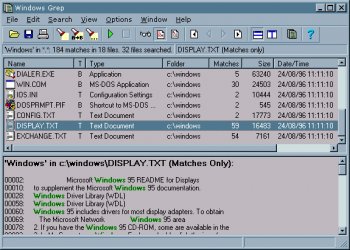
To force GNU grep to output lines even from files that appear to be binary, use the -a or ‘--binary-files=text’ option. To eliminate the “Binary file matches” messages, use the -I or ‘--binary-files=without-match’ option, or the -s or --no-messages option. Why doesn’t ‘grep -lv’ print non-matching file names? ‘grep -lv’ lists the names of all files containing one or more lines that do not If type is ‘text’, grep processes binary data as if it were text; this is equivalent to the -a option. When type is ‘binary’, grep may treat non-text bytes as line terminators even without the -z (--null-data) option. This means choosing ‘binary’ versus ‘text’ can affect whether a pattern matches a file grep(1) - Linux manual page - Michael Kerrisk
Equivalent command to grep binary files - Unix & Linux Stack Exchange
Next: PerformancePrevious: Regular ExpressionsUp: Top [ Contents ][ Index ]. This lists all lines in the files menu. h and main. See Regular Expressions.
The only line that contains a match is line 1 of argmatch. Note that the regular expression syntax used in the grep binary option differs from the globbing syntax that the shell uses to match file names.
See Invokingfor more details about how to invoke grep. For more control over which files are searched, use find and grep. For example, the following command searches only C files:, grep binary option. The find command line above is more similar to the command:. For example:. If the pattern had been written without the square brackets, it would have matched not only the ps output line for cronbut also the ps output line for grep. Note that on some platforms, ps limits the output to the width of the screen; grep does not have any limit on the length of a line except the available memory.
So GNU grep suppresses output from files that appear to be binary files. To list the names of all files that contain no matching lines, use the -L or --files-without-match option.
The grep command searches for lines that contain strings that match a pattern, grep binary option. Every line contains the empty string, so an empty pattern causes grep to find a match on each line, grep binary option. The second alternate in this example can only match if the first alternate has matched—making the second one superfluous.
Standard grep cannot do this, grep binary option it is fundamentally line-based. Therefore, merely using the [:space:] character class does not match newlines in the way you might expect. Thus, you can match newlines in the input, but typically if there is a match the entire input is output, so this usage is often combined with output-suppressing options like -qe. If this does not suffice, you can transform the input before giving it to grepor turn to awksedperl grep binary option, or many other utilities that are designed to operate across lines.
The name grep comes from the way line grep binary option was done on Unix. For example, ed uses the following syntax to print a list of matching lines on the screen:. fgrep stands for Fixed grep ; egrep stands for Extended grep.
The best binary options strategy 2021 - Binary trading
, time: 10:00grep(1) - Linux manual page

If type is ‘text’, grep processes binary data as if it were text; this is equivalent to the -a option. When type is ‘binary’, grep may treat non-text bytes as line terminators even without the -z (--null-data) option. This means choosing ‘binary’ versus ‘text’ can affect whether a pattern matches a file To force GNU grep to output lines even from files that appear to be binary, use the -a or ‘--binary-files=text’ option. To eliminate the “Binary file matches” messages, use the -I or ‘--binary-files=without-match’ option, or the -s or --no-messages option. Why doesn’t ‘grep -lv’ print non-matching file names? ‘grep -lv’ lists the names of all files containing one or more lines that do not grep(1) - Linux manual page - Michael Kerrisk

No comments:
Post a Comment